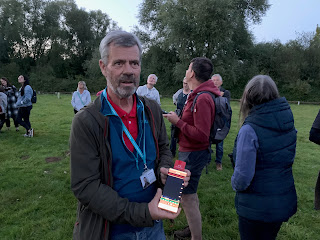Words and images by Miranda Gavin
This is my first Bat Walk (Saturday 2 September 2023) and I’ve come to Emberton Country Park, situated in the village of Emberton just a few miles northeast of Milton Keynes, to learn more about the only mammals that can fly. Led by bat enthusiast and Buckinghamshire County recorder for dragonflies, Alan Nelson, and Emberton Country Park ranger, Stephen Barnes-Green, the group listening to Alan’s introductory talk is larger than I expected, and I count almost 30 adults and children. But it’s the bat facts and the Batbox that intrigue me.
The UK boasts 18 species of bats, of which 17 breed here and the 200-acre parkland has, to date, recorded six species—common pipistrelle, soprano pipistrelle, serotine, barbastelle, noctule and the brown long-eared bat. “We may have more,” Alan says, adding that a proper survey is needed but it’s proving hard to find enthusiasts to help.
For now, we’re bat novices finding out about a species that most of us only know from horror films and DC comics. Bats give birth to one live offspring called a pup; the young feed on their mother’s milk; they hibernate in the winter, roost, and like to follow water, especially rivers and canals. There are, we learn, different types of roosts—bachelor roosts, maternity roosts, and social roosts. Bats are not blind, instead they use echolocation to navigate the skies and catch prey in the dark.
Bat Walk leader, Alan Nelson with his Batbox Duet Bat Detector
Tonight, we expect our first guest to be the noctule. This magnificent bat has a wingspan the size of a dinner plate and appears just after sunset, followed by the pipistrelles and the Daubenton’s bat. As dusk sets in, Alan shows us his Batbox Duet Bat Detector, a device that picks up the sounds emitted by different bats. Stephen has a bat detector too, but it’s more modern and is linked to his mobile phone. Not only are bat sounds too high pitched for humans to hear without these devices, (you can find more about bat detectors on Bat Conservation Trust's website) but different species can be heard at different frequencies.
I am curious as to how to describe the various staccato-like clicks of bats, and Alan tells me that the Daubenton’s bat sounds like marbles being dropped onto a stone floor. “I started doing bat work many years ago and the assumption was that they only had one frequency,” Alan explains. “But it’s been proved that they have a range of frequency which can change. Evolution is wonderful and we’re still discovering a lot about bats. It’s a big learn.”

Emberton Country Park ranger, Stephen Barnes-Green
Then I ask why bats change their frequency and Alan smiles, “It’s because they’re intelligent!” We all laugh, including Bella Ashford, the four-year old who is here with her older sister of 10 and her mother and father, Ben and Natalie. “Some of our friends were camping here and they found out that there was a Bat Walk this evening,” Ben says as we set off through the park. “Although we came last weekend and saw quite a few bats, when they told us about this walk, we decided to come along and we’re loving it.”
 |
| Spotting a noctule |
The noctule hunts for insects but with an increasing loss of habitat and use of insecticides, insect populations are dwindling. Once a gravel works, Emberton was transformed by Milton Keynes City Council into England’s first Country Park in 1965 and is a haven for wildlife enthusiasts with its four lakes, wooded glades, and meadows. There are even camping areas and static caravan plots for longer, more immersive stays.
Alan and Stephen are ambassadors for the wildlife at Emberton Country Park and their enthusiasm and commitment to educate and protect the natural environment is infectious. By the end of the walk, I was hooked. We’d sighted five of the six species found at the park—noctule, soprano pipistrelle, common pipistrelle, brown long-eared and Daubenton's bat. And it was clear that, if want to protect this endangered species, there’s a vital need for comprehensive bat surveys. But with limited resources available, the park is reliant on volunteers, which Is why Emberton Country Park is reaching out to enthusiasts who would like to take part.
CALL FOR ACTION: To support a bat survey at Emberton Country Park, please email emberton.park@milton-keynes.gov.uk or call 01234 711575 for further details. Alternatively, get in touch to find out about the next bat walk.







No comments:
Post a Comment